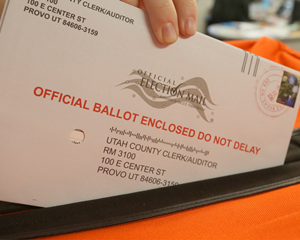He spent months pondering scenarios and talking to experts. It wasn't hard to find liberals who saw Trump as a dangerous dictator, but Podhorzer was careful to steer clear of hysteria. What he wanted to know was not how American democracy was dying but how it might be kept alive. The chief difference between the U.S. and countries that lost their grip on democracy, he concluded, was that America's decentralized election system couldn't be rigged in one fell swoop. That presented an opportunity to shore it up.
他花了幾個月的時間考慮各種方案并與專家交談。在自由派看來,把特朗普視為危險的獨裁者并不難,但波德霍澤小心翼翼地避免歇斯底里。他想知道的不是美國民主是如何消亡的,而是如何讓它繼續存在下去。他總結道,美國與那些失去了對民主的控制的國家之間的主要區別在于,美國分散的選舉制度不可能一下子就被操縱。這提供了一個支持它的機會。
On March 3, Podhorzer drafted a three-page confidential memo titled "Threats to the 2020 Election." "Trump has made it clear that this will not be a fair election, and that he will reject anything but his own re-election as 'fake' and rigged," he wrote. "On Nov. 3, should the media report otherwise, he will use the right-wing information system to establish his narrative and incite his supporters to protest." The memo laid out four categories of challenges: attacks on voters, attacks on election administration, attacks on Trump's political opponents and "efforts to reverse the results of the election."
3月3日,Podhorzer起草了一份名為“對2020年選舉的威脅”的三頁機密備忘錄。“特朗普已經明確表示這將不是一場公平的選舉,他會拒絕任何東西,除了他自己的連任,認為這是‘假的’和被操縱的,”他寫道。“11月3日,如果媒體報道不是這樣,他就會利用右翼信息系統來建立自己的敘事,煽動支持者抗議。”備忘錄列出了四類挑戰:對選民的攻擊、對選舉管理部門的攻擊、對特朗普的政治對手的攻擊以及“扭轉選舉結果的努力”。

Then COVID-19 erupted at the height of the primary-election season. Normal methods of voting were no longer safe for voters or the mostly elderly volunteers who normally staff polling places. But political disagreements, intensified by Trump's crusade against mail voting, prevented some states from making it easier to vote absentee and for jurisdictions to count those votes in a timely manner. Chaos ensued. Ohio shut down in-person voting for its primary, leading to minuscule turnout. A poll-worker shortage in Milwaukee—where Wisconsin's heavily Democratic Black population is concentrated—left just five open polling places, down from 182. In New York, vote counting took more than a month.
隨后,2019冠狀病毒病(COVID-19)在初選季的高潮爆發。一般的投票方式對選民或通常在投票地點工作的以長者為主的志愿人員已不再安全。但是,由于特朗普反對郵寄投票的運動加劇了政治分歧,一些州無法讓缺席投票變得更容易,也無法讓司法管轄區及時統計這些選票。混亂接踵而至。俄亥俄州關閉了初選的親自投票,導致投票率非常低。在威斯康辛州民主黨黑人人口集中的密爾瓦基,由于投票站工作人員短缺,只剩下5個開放的投票站,從182個下降到5個。在紐約,計票工作耗時一個多月。
Suddenly, the potential for a November meltdown was obvious. In his apartment in the D.C. suburbs, Podhorzer began working from his laptop at his kitchen table, holding back-to-back Zoom meetings for hours a day with his network of contacts across the progressive universe: the labor movement; the institutional left, like Planned Parenthood and Greenpeace; resistance groups like Indivisible and MoveOn; progressive data geeks and strategists, representatives of donors and foundations, state-level grassroots organizers, racial-justice activists and others.
突然間,11月核反應堆熔毀的可能性顯而易見。在他位于華盛頓郊區的公寓里,波德霍澤開始在廚房的桌子上用筆記本電腦工作,每天和他在進步領域的人脈網絡連續幾個小時開Zoom會議:勞工運動;制度上的左派,如計劃生育和綠色和平組織;像“不可分割”和“移動”等抵抗組織;進步的數據極客和戰略家,捐贈者和基金會的代表,州級草根組織者,種族正義活動家等。
譯文由可可原創,僅供學習交流使用,未經許可請勿轉載。











